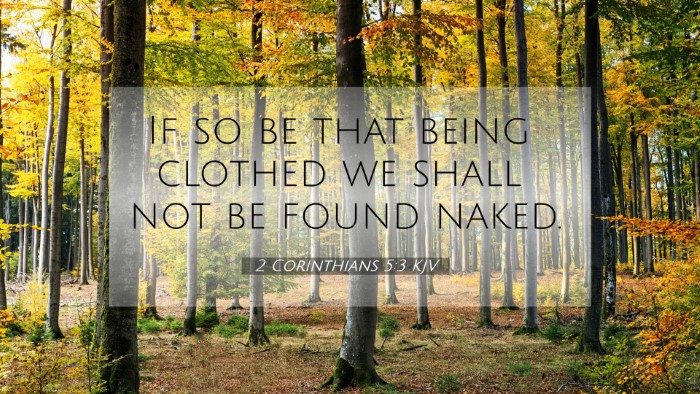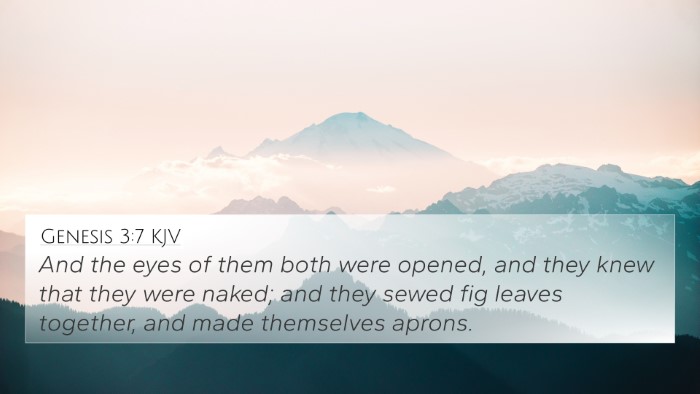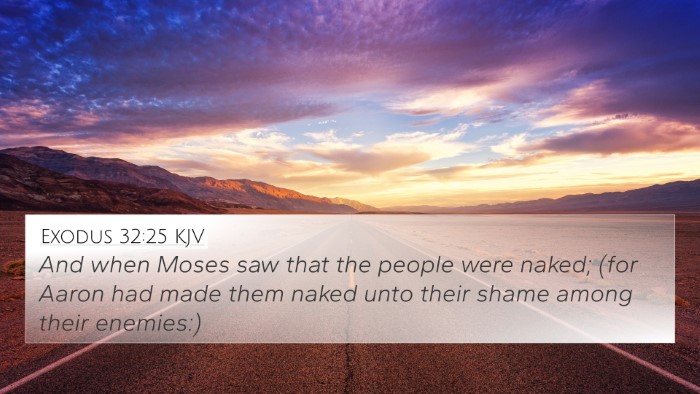Understanding 2 Corinthians 5:3
Bible Verse: For we are in this tent, we groan, being burdened; not because we want to be unclothed, but further clothed, that mortality may be swallowed up by life.
Summary of the Verse Meaning
In 2 Corinthians 5:3, the Apostle Paul uses the metaphor of a "tent" to describe our earthly bodies, emphasizing their temporary nature. The "groaning" signifies the struggles of life and the desire for a more permanent, glorious existence beyond our current, mortal state. Paul expresses a yearning for transformation and the hope that, through faith, believers will experience a divine enhancement of life, where mortality is replaced with eternal existence.
Commentary Insights
-
Matthew Henry's Commentary:
Matthew Henry describes the "tent" as a representation of our fragile and transient bodies. He highlights the _spiritual longing_ we feel within us, desiring not merely to be rid of our bodies but to be sanctified and enhanced through the divine life God promises. This verse, he notes, is filled with hope and assurance of a future resurrection where we are clothed in immortality.
-
Albert Barnes' Notes:
Albert Barnes emphasizes the duality present in our existence – being "in the tent" symbolizes our earthly lives, while the longing for further clothing represents the desire for eternal existence. He discusses the significance of _suffering and discomfort_ in our current lives that drives believers toward seeking the eternal life promised by Christ, echoing the themes of renewal and revival inherent in the Christian faith.
-
Adam Clarke's Commentary:
Adam Clarke elaborates on the burden of living in a decaying body and the yearning for a more enduring form of existence. He contrasts _the limitations of human life_ with the enriching life promised in Christ, urging readers to comprehend that our earthly experiences are meant to encourage us towards seeking that which is eternal and perfect through divine guidance.
Bible Cross References
- 2 Corinthians 5:1: This verse speaks of the heavenly dwelling God has prepared for believers, reinforcing the theme of hope in eternal life.
- Romans 8:23: Paul mentions eagerly waiting for the adoption as children and the redemption of our bodies, echoing the same groaning for renewal.
- Philippians 3:21: Here, Paul discusses how God will transform our lowly body to be like His glorious body, emphasizing the hope of transformation.
- 1 Corinthians 15:54: This verse speaks of death being swallowed up in victory, aligning with the theme of mortality being overcome by life.
- 2 Timothy 1:10: This verse discusses the abolishment of death and the bringing of life and immortality to light through the Gospel.
- Romans 14:8: No matter whether living or dying, we belong to the Lord, which connects back to the assurance of eternal life promised in Christ.
- John 11:25-26: Jesus declares that He is the resurrection and the life, further instilling faith in the transformation of life beyond death.
- Revelation 21:4: This describes God wiping away every tear and abolishing death, again aligning with eternal life themes presented by Paul.
- Colossians 3:4: It emphasizes that when Christ appears, those who are His will also appear with Him in glory, underlining the transformation believers anticipate.
- 1 Peter 5:10: This verse discusses the God of all grace perfecting, confirming, strengthening, and establishing the believers for eternal life, fitting the theme Paul addresses.
Connections between Biblical Texts
2 Corinthians 5:3 is deeply interwoven with various themes throughout Scripture. It connects not only with the notions of mortality and immortality but also binds numerous verses that highlight the transformative nature of faith and the aspiration for redemption.
Thematic Bible Verse Connections
- The transient nature of earthly existence (2 Corinthians 5:1, 2 Corinthians 4:16).
- The hope and assurance of resurrection (1 Corinthians 15:20-22).
- The contrast between earthly suffering and heavenly glory (Romans 8:18).
Comparative Bible Verse Analysis
Understanding 2 Corinthians 5:3 in conjunction with its related passages allows us to grasp the full narrative of Christian hope. This verse stands at the intersection of discussions about mortality, the nature of suffering, and the promise of what is to come in Christ, inviting deeper reflection and study.
Bible Cross-Reference Tools
Utilizing tools such as a Bible concordance or a cross-reference Bible study guide can greatly enrich one's study, facilitating the exploration of themes and connections. Tools that allow for easy navigation of cross-references enable students of the Word to delve deeper into understanding the rich tapestry of Scripture.
Conclusion
In conclusion, 2 Corinthians 5:3 offers profound insights into the Christian life, highlighting our mortal struggles while assuring us of the glorious future awaiting believers. Through careful cross-referencing and thematic connections, we can uncover the depth of meaning found within this text and its relationship to the entirety of Scripture.






